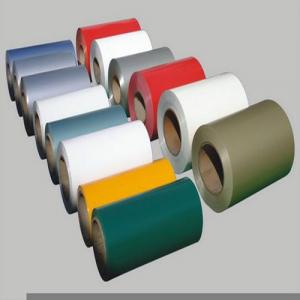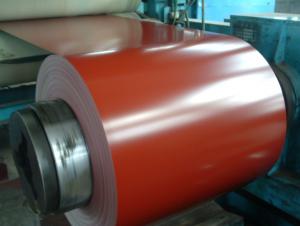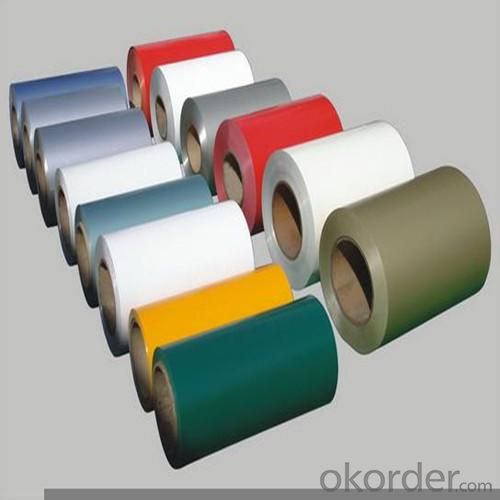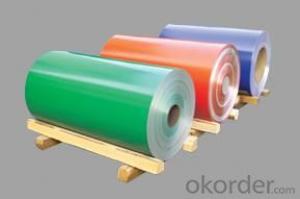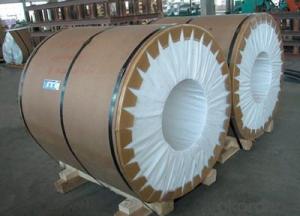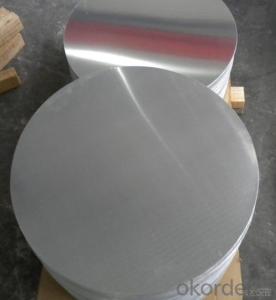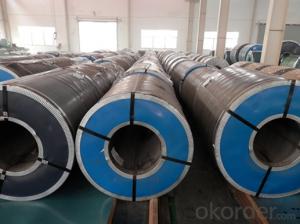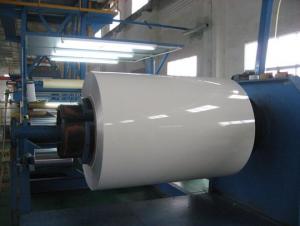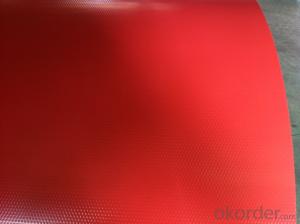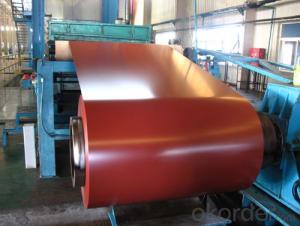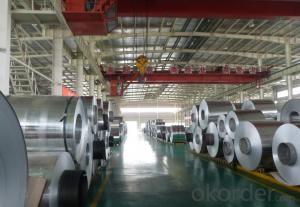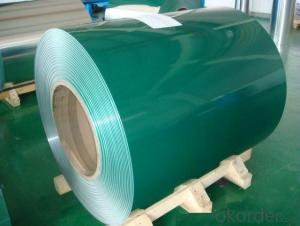York Aluminum Coils - PVDF Coated Aluminum Coil Thickness 0.10-4.0mm
- Loading Port:
- China main port
- Payment Terms:
- TT or L/C
- Min Order Qty:
- 3 m.t.
- Supply Capability:
- 8000 m.t./month
OKorder Service Pledge
OKorder Financial Service
You Might Also Like
1 Specifications of PVDF Coated Aluminum Coil/Sheet
Alloy | AA1050,AA1060, AA1070, AA1100, AA3003, AA3004, AA3005, AA3105, AA5005, AA5052, AA5754, AA5083, AA8011 |
Temper: | H12, H14, H16, H18, H22, H24, H26, H32,HO, F |
Thickness: | 0.10-4.0mm |
Width: | 10mm- 2000mm |
Coating | PVDF |
Painting Thickness | Standard 16-25 microns, max 40 microns |
Color | Acording to Ral colors or customer’s samples |
Standard: | GB/T17748-1999, ASTM, ISO, EU standard |
Special Specification is available on customer’s requirement | |
PVDF(fluorine-carbon) Coating
PVDF(fluorine-carbon) coating :made of fluorine carbon resin, pigment, ester solvent, after high temperature roasting and baking, the paint is solidified to dry film with super weather resistance. PVDF coating also can be classified as traditional PVDF and nanometer PVDF coating.
A.Traditional PVDF Coating, with KYNAR500 PVDF, two or three times for coating and baking, has good properties of anti-acid, anti-alkali and is durable in atrocious weather and environment, keeping 15 years no unwonted fading. In view of these facts, we recommend this panel applied for external wall cladding.
B.Nanometer PVDF Coating, which different with traditional PVDF is the clear coating. It contains nanometer element, which can protect panel from pollution, Because nanometer has self-cleaning effect, It easy to get rid of dust and pollution by raining or water.
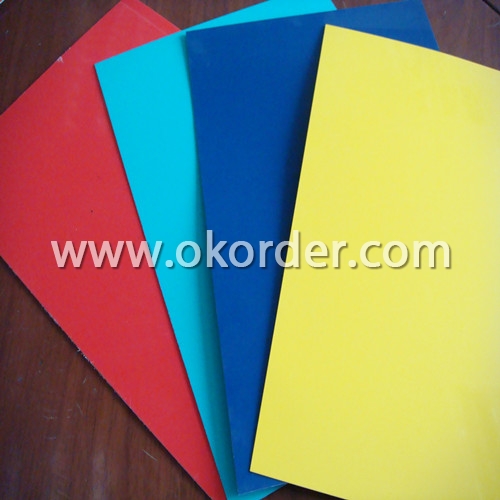
2 Usage/Applications of PVDF Coated Aluminum Coil/Sheet
Our company's PVDF Coated Aluminum Coil/Sheet have been widely used in the fields of construction and decoration(garage doors, ceiling etc.), electronic appliances, lighting decoration, air-condition air pipe, sanwich panels and drainage, etc.
3 Packaging & Delivery of PVDF Coated Aluminum Coil/Sheet
Seaworthy package, plastic bag covered inside, carton wrapped outside, paper core, on the wooden pallet. Pallet weight: 2000-25000KG.
Shipment:the goods will be delivered in 40 days after getting the buyer's payment.
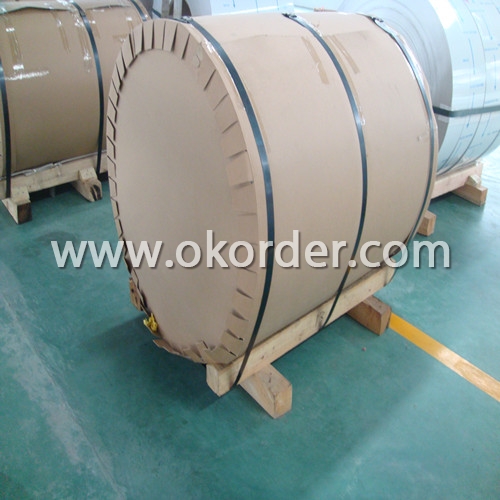
4 Production Flow of PVDF Coated Aluminum Coil/Sheet
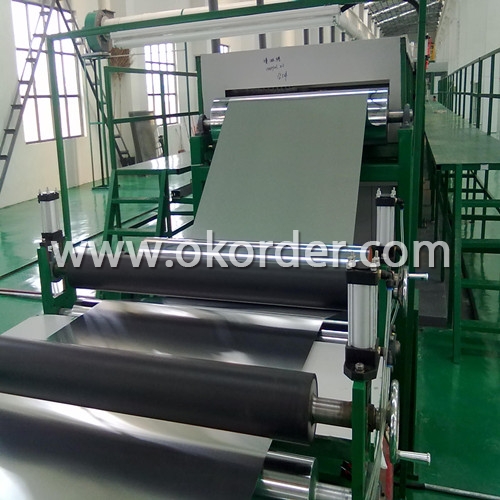
| Aluminum Alloy | AA1100; AA3003; AA5005 |
| Coil thickness | 0.25mm,0.30mm,0.40mm,0.50mm |
| Coil width | 1240mm, 1270mm, 1520mm, 1550mm, 1575mm |
| Coating thickness | Over 25 micro |
| Diameter | 405mm, 505mm |
| Coil weight | 2.5 to 3.0 tons per coil |
| Color | White series, metallic series, Dark series, Gold series( accept color customs) |
Coated Aluminum Coil
The coated aluminum coil is ideal for producing aluminium composite materials. Huawei aluminium coil is coated with high quality fluororesin paint which offers good weather resistance.
- Q: What are the thermal conductivity properties of aluminum coils?
- Aluminum coils have high thermal conductivity properties, which means they are efficient in transferring heat.
- Q: aluminum welding
- You can't. you need a TIG welder to weld aluminum. It's an especially hot welder for aluminum specifically.
- Q: Is it possible to use a soldering iron to solder a copper coil in place of an aluminum coil?
- <p>Yes, you can use a soldering iron to solder a copper coil instead of an aluminum coil. Copper has a higher melting point than aluminum, so you may need to use a soldering iron with a higher temperature setting or a higher melting point solder. Ensure that the solder you use is compatible with copper, as some solders are specifically designed for aluminum. When soldering copper, it's also important to clean the surface thoroughly to remove any oxidation, as this can affect the solder joint's quality.</p>
- Q: What is the typical hardness of aluminum coils?
- The typical hardness of aluminum coils can vary depending on the specific alloy and temper used, but generally falls within the range of 40-70 on the Rockwell B scale.
- Q: My front door is scraping the aluminum frame door jam thing on the bottom. Also underneith the door itself it seems like there is a huge aluminum device covering the whole bottom of it and an aluminum weather stipper built into that. Is my only option to have the door pulled off. Or could I maybe grind of file down the aluminum on the bottom?
- You okorder /
- Q: Can aluminum coils be used in explosive environments?
- No, aluminum coils cannot be used in explosive environments as aluminum is not intrinsically safe and can ignite or cause sparks in the presence of flammable or explosive gases.
- Q: How are aluminum coils inspected for quality control?
- To maintain quality control, aluminum coils undergo a thorough examination employing visual inspections and various non-destructive testing methods. These measures guarantee that the coils conform to the necessary specifications and are devoid of any flaws or defects. In order to identify surface defects, including scratches, dents, and irregularities in shape or size, trained personnel meticulously scrutinize the coils. Additionally, inspectors check for signs of contamination, oxidation, or discoloration. If any abnormalities are detected during this visual inspection, they are promptly noted and addressed. Apart from visual inspections, internal quality evaluation of the aluminum coils is conducted through non-destructive testing techniques. One commonly employed method is ultrasonic testing, which involves transmitting high-frequency sound waves through the coils. The reflected sound waves are then analyzed to detect internal defects such as voids, cracks, or delaminations. This technique allows for a comprehensive assessment of the coil's integrity without causing any harm to the material. Another non-destructive testing method used for quality control is eddy current testing. This technique induces electrical currents in the coils and measures the resulting magnetic fields. Any variations in the magnetic fields can indicate flaws or defects in the aluminum, such as cracks or inclusions. Eddy current testing is particularly effective in identifying surface defects and discontinuities. Furthermore, measurements of crucial physical properties such as thickness, width, and flatness are taken to ensure compliance with the required standards. Specialized instruments like micrometers, calipers, or laser scanners are typically employed for this purpose. In conclusion, the inspection process for aluminum coils encompasses a combination of visual inspections and non-destructive testing methods. This comprehensive approach guarantees that the coils are fault-free, meet the necessary specifications, and exhibit superior quality.
- Q: What does 1060 stand for in 1060 aluminum rolling?
- The aluminum has 5052.5005.1006.1060.1070.2024 types which has different compositions. Like iron, different carbon content and different properties of iron.
- Q: This question asks for a method to calculate the diameter of an aluminum coil using its weight and density.
- <p>To calculate the diameter of an aluminum coil based on its weight and density, you first need to know the volume of the coil. The formula for volume (V) is V = mass (m) / density (蟻). Once you have the volume, you can use the formula for the volume of a cylinder, V = 蟺r虏h, where r is the radius and h is the height (or length) of the coil. If you know the height of the coil, you can solve for the radius and then double it to find the diameter (D = 2r). Ensure you have consistent units for all measurements. This calculation assumes the coil is cylindrical and uniform in thickness.</p>
- Q: How do aluminum coils perform in corrosive environments?
- Aluminum coils perform exceptionally well in corrosive environments due to their natural resistance to corrosion. The formation of a thin, protective oxide layer on the surface of aluminum coils helps prevent further corrosion from occurring. This property makes them highly suitable for applications exposed to moisture, chemicals, and other corrosive agents.
1. Manufacturer Overview
| Location | Henan,China |
| Year Established | 2002 |
| Annual Output Value | Above US$200 Million |
| Main Markets | Mid East;Eastern Europe;North America |
| Company Certifications | ISO 9001:2000;ISO 14001:2004;OHSAS 18001 |
2. Manufacturer Certificates
| a) Certification Name | |
| Range | |
| Reference | |
| Validity Period |
3. Manufacturer Capability
| a) Trade Capacity | |
| Nearest Port | Shanghai |
| Export Percentage | 30%-50% |
| No.of Employees in Trade Department | 21-50 People |
| Language Spoken: | English;Chinese |
| b) Factory Information | |
| Factory Size: | Above 100,000 square meters |
| No. of Production Lines | Above 10 |
| Contract Manufacturing | OEM Service Offered;Design Service Offered |
| Product Price Range | Average |
Send your message to us
York Aluminum Coils - PVDF Coated Aluminum Coil Thickness 0.10-4.0mm
- Loading Port:
- China main port
- Payment Terms:
- TT or L/C
- Min Order Qty:
- 3 m.t.
- Supply Capability:
- 8000 m.t./month
OKorder Service Pledge
OKorder Financial Service
Similar products
Hot products
Hot Searches
Related keywords

